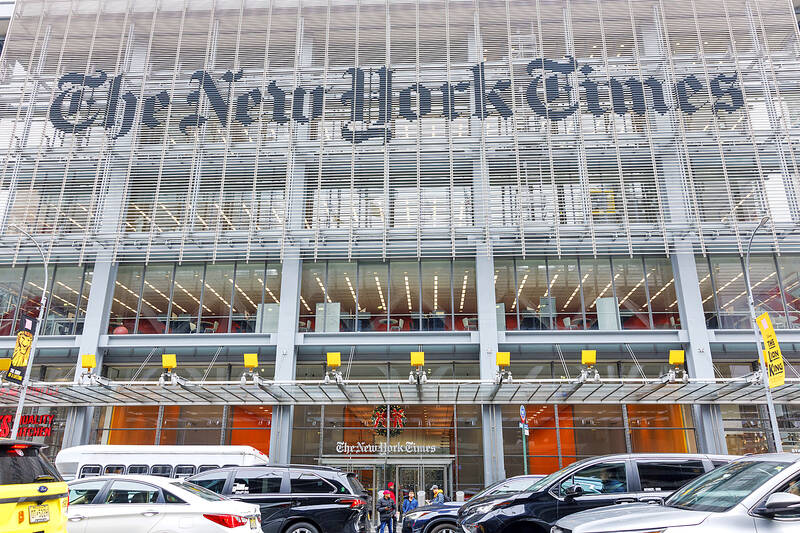The New York Times is suing Microsoft Corp and OpenAI Inc for using its content to help develop artificial intelligence (AI) services, in a sign of the increasingly fraught relationship between the media and a technology that could upend the news industry.
The technology firms rely on millions of copyrighted articles to train chatbots such as OpenAI’s ChatGPT and other AI features, allegedly causing billions of US dollars in statutory and actual damages, according to a lawsuit filed in New York on Wednesday.
The New York Times did not specify its monetary demands.

Photo: EPA-EFE
AI TRAINING
OpenAI has faced criticism for scraping text widely from the Web to train its popular chatbot since it debuted a year ago. While it has been sued by prominent authors, this is the first challenge to its practices by a major media organization.
The start-up has sought licensing deals with publishers, much like Alphabet Inc’s Google and Meta Platforms Inc’s Facebook have done.
The lawsuit says the publisher reached out to Microsoft and OpenAI in April and could not reach an amicable solution.
“We respect the rights of content creators and owners and are committed to working with them to ensure they benefit from AI technology and new revenue models,” an OpenAI spokesperson said in a statement. “Our ongoing conversations with the New York Times have been productive and moving forward constructively, so we are surprised and disappointed with this development.”
Microsoft declined to comment.
LAWSUITS
OpenAI in July signed an agreement with The Associated Press to access some of the news agency’s archives. OpenAI cut a three-year deal this month with Axel Springer SE to use the German media company’s work for an undisclosed sum.
“We’re hopeful that we will find a mutually beneficial way to work together, as we are doing with many other publishers,” the OpenAI spokesperson said.
OpenAI has been the target of multiple lawsuits from content producers complaining that their work has been improperly used for AI training. The company faces class actions from cultural figures, including comedian Sarah Silverman, Game of Thrones author George R.R. Martin and Pulitzer Prize-winning author Michael Chabon.
The cases are still in their early stages and could take years to fully resolve. A judge in San Francisco earlier this month hinted at trimming Silverman’s copyright lawsuit against OpenAI. The judge had already narrowed a similar Silverman suit against Meta.
Microsoft is OpenAI’s largest backer and has deployed the start-up’s AI tools in several of its products. In the lawsuit, the New York Times alleged that Microsoft copied the newspaper’s articles verbatim for its Bing search engine and used OpenAI’s technology to boost its value by US$1 trillion dollars.
“If Microsoft and OpenAI want to use our work for commercial purposes, the law requires that they first obtain our permission,” a New York Times spokesperson said in an e-mailed statement. “They have not done so.”

A magnitude 5.6 earthquake struck off the coast of Yilan County at 12:37pm today, with clear shaking felt across much of northern Taiwan. There were no immediate reports of damage. The epicenter of the quake was 16.9km east-southeast of Yilan County Hall offshore at a depth of 66.8km, Central Weather Administration (CWA) data showed. The maximum intensity registered at a 4 in Yilan County’s Nanao Township (南澳) on Taiwan’s seven-tier scale. Other parts of Yilan, as well as certain areas of Hualien County, Taipei, New Taipei City, Taoyuan, Hsinchu County, Taichung and Miaoli County, recorded intensities of 3. Residents of Yilan County and Taipei received

Taiwan has secured another breakthrough in fruit exports, with jujubes, dragon fruit and lychees approved for shipment to the EU, the Ministry of Agriculture said yesterday. The Animal and Plant Health Inspection Agency on Thursday received formal notification of the approval from the EU, the ministry said, adding that the decision was expected to expand Taiwanese fruit producers’ access to high-end European markets. Taiwan exported 126 tonnes of lychees last year, valued at US$1.48 million, with Japan accounting for 102 tonnes. Other export destinations included New Zealand, Hong Kong, the US and Australia, ministry data showed. Jujube exports totaled 103 tonnes, valued at

BIG SPENDERS: Foreign investors bought the most Taiwan equities since 2005, signaling confidence that an AI boom would continue to benefit chipmakers Taiwan Semiconductor Manufacturing Co’s (TSMC, 台積電) market capitalization swelled to US$2 trillion for the first time following a 4.25 percent rally in its American depositary receipts (ADR) overnight, putting the world’s biggest contract chipmaker sixth on the list of the world’s biggest companies by market capitalization, just behind Amazon.com Inc. The site CompaniesMarketcap.com ranked TSMC ahead of Saudi Aramco and Meta Platforms Inc. The Taiwanese company’s ADRs on Tuesday surged to US$385.75 on the New York Stock Exchange, as strong demand for artificial intelligence (AI) applications led to chip supply constraints and boost revenue growth to record-breaking levels. Each TSMC ADR represents

TRUST: The KMT said it respected the US’ timing and considerations, and hoped it would continue to honor its commitments to helping Taiwan bolster its defenses and deterrence US President Donald Trump is delaying a multibillion-dollar arms sale to Taiwan to ensure his visit to Beijing is successful, a New York Times report said. The weapons sales package has stalled in the US Department of State, the report said, citing US officials it did not identify. The White House has told agencies not to push forward ahead of Trump’s meeting with Chinese President Xi Jinping (習近平), it said. The two last month held a phone call to discuss trade and geopolitical flashpoints ahead of the summit. Xi raised the Taiwan issue and urged the US to handle arms sales to